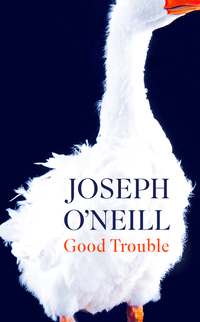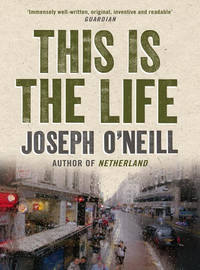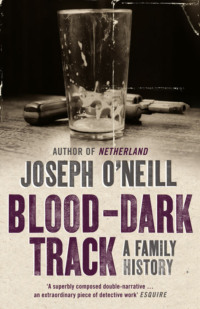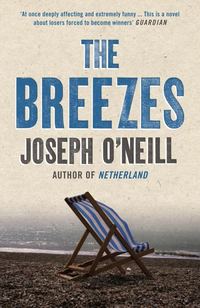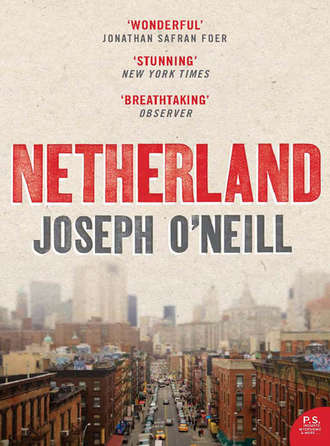
Полная версия
Netherland
For cricket is played in Holland. There are a few thousand Dutch cricketers and they go about their game with the seriousness and organisation that characterises all of Dutch sport. The conservative, slightly stuck-up stratum of society, in which I grew up, especially loves cricket, and the players are ghosts of sorts from an Anglophile past: I am from The Hague, where Dutch bourgeois snobbishness and Dutch cricket are, not unrelatedly, most concentrated. We – that is, my mother and I – lived in a semi-detached house on Tortellaan, a quiet street near Sportlaan. From Houtrust, where the indoor skating rink was located and where I first held a girl’s hand in romantic earnest (not on the ice but in the cafeteria, where kids gathered to spend their pocket money on cones of frites met mayonnaise), Sportlaan led south towards the dunes and seaside hotels of Kijkduin. It also led, if you exercised your imagination, to Paris: one year, the hunched, bright-shirted racers of the Tour de France zoomed by like fantastically bicycling macaws. On the far side of Sportlaan were woods called the Bosjes van Pex, and in the woods was the home of a venerable football and cricket club, Houdt Braef Standt – HBS. I joined HBS at the age of seven, anxiously attending the membership interview with my mother. I am not sure what these encounters were designed to accomplish, but in any event I had no cause to worry. When the meeting was over the members of the committee gravely shook my hand and said, Welcome to HBS. I was thrilled. I was too young to realise they’d all known my father, who had been a member of the club for nearly forty years, and that it must have given them great pleasure to take his son under their wing. For that’s how these sports clubs functioned: they took on scores of boys almost as hatchlings and bestowed parental care and effort on them for years, even on those who were athletically hopeless. From September through April I played football, proudly wearing the club’s black shirt and black shorts bought at the sporting goods store on Fahrenheitstraat; and from May through August I played cricket. I loved both sports equally; but by my mid-teens, cricket had claimed its first place. We played on coconut matting wickets, and our outfields, used also for winter games, were sluggish; but there any resemblance to American cricket ended.
What ached me, as I paused on 19th Street two decades later, was the memory of lovely solitary cycle rides, on sunny and tranquil mornings like this one in Chelsea, through the fragmented brilliance of the woods around the HBS grounds, my red Gray-Nicolls bag resting between the handlebars of my bicycle, a lambswool sweater slung over my shoulders. Lacoste polo shirts, bright V-necked sweaters, brogues, diamond-patterned Burlington socks, corduroy trousers: I and men I knew dressed that way, even as teenagers. Then came a second memory, of my mother watching me play. It was her habit to unfold a portable chair by the western sightscreen and to sit there for hours, grading homework and occasionally looking up to follow the game. Although always friendly, she rarely spoke to the other spectators scattered along the boundary’s whitewashed planks, which, laid end to end, distantly encircled the batsman and marked the edge of his innings’ impermanent heaven. Your innings might be over in a second, as a life in eternity. Out, you trudged off miserably, irrevocably dismissed into the nothingness of the non-participant: the amateur cricketer does not enjoy, as the baseballer does, the glimmering prospect of numerous at-bats. You get only one chance, in the blazing middle. When neither fielding nor batting, I and a teammate or two would embark on a rondje – a stroll round the field – smoking cigarettes and acknowledging various parents and interested parties. My mother was known independently to many of the boys at the club because they were current or former pupils of hers.
‘Dag, mevrouw van den Broek. Alles goed?’
‘Ja, dank je, Willem.’
We were cordial, somewhat arrogant young men, in accordance with our upbringing.
My cricket career at HBS dwindled while I studied classics at Leiden University. When my first adult job, with Shell Oil, returned me to The Hague at the age of twenty-four, I had grown away from my club. I would not play cricket again until years later, when I went to London to become an analyst at D——Bank and joined South Bank Cricket Club, whose home, at Turney Road, was near Herne Hill, in the south of the city. On marvellously shorn Surrey village greens – the smell of grass when mown in May provokes in me pangs of emotion that I still dare not dwell on – we battled gently for victory and drank warm beer on the steps of ancient wooden pavilions. Once, after a shaky start to the season, I booked a private net at Lord’s. An elderly coach with the countenance of a butler fed balls into a bowling machine and declared, ‘Good shot, sir,’ each time my bat connected with one of the long hops and half-volleys the machine amiably spat out. All of it was agreeable, English and enchanting; but I quit after a couple of seasons. With my mother no longer watching, cricket was never quite the same again.
Rachel came to Turney Road once. She approached on foot across the green blankness of the sports ground. My team was fielding, and for an hour she sat by herself on the grass. I could sense her boredom from a hundred yards. Between innings, when the teams drank tea and ate cakes and sandwiches, she and I got together. I brought her a cup of tea and sat down with her, self-consciously detached from the rows of players seated at the main table. ‘Sandwich?’ I said, offering her one of mine, a gluey, cheesy thing that only a starving player could bring himself to eat. She shook her head. ‘How can you bear it?’ she blurted. ‘All that standing around.’ I smiled regretfully. Not wanting to spoil my afternoon, she said, ‘Although you do look nice in that hat.’ It was her only attempt at spectatorship.
To my surprise, my mother continued attending matches at HBS even when I no longer played. It had not dawned on her son that following his progress might not have been her main purpose. Though comfortable at the club, my mother never discovered the talent for jolliness that animated many of the older characters for whom the place was a home away from home. The clubhouse, with its billiards tables and borreltjes, was not for her. At stumps she would fold up her chair and make her way directly to the car park, smiling at the many familiar faces she saw. Only now do I appreciate how for her, too, there must have been balminess in the sights and sounds and rhythms of a full day’s cricket, in which unhurried time is portioned out by the ticking of ball against bat, and only now do I ask myself about the thoughts occupying her mind as she sat there with a red blanket over her knees, sometimes from eleven in the morning till six or seven in the evening. She was unrevealing about such matters. When she spoke about my father, it would only be to mention a small fact or two – how his job at the air ministry had bored him; how he liked to eat raw herring, slathered in onions and dangled vertically into the mouth, in Scheveningen; how he loved Cassius Clay. My father, Marcel van den Broek, was significantly older than my mother. She was thirty-three when they married, in 1966, and he was forty-three. In January, 1970, my father was the front-seat passenger in a car travelling near Breda, in the south of the country. There was an accident and he flew through the windscreen. He was killed. I was not yet two.
So I walked directly from 19th Street to the storage unit by Chelsea Piers where our loft furnishings had been dumped, and searched around for the cricketing gear I’d brought with me from Europe and which it had never occurred to me either to throw out or to use. The Duncan Fearnley trunk was in a corner at the back. The latches flipped up with a snap, releasing that bitter marmalade odour of neglected cricket apparel. It was all there, the old kit: the Slazenger Viv Richards batting pads with stuffing leaking from the seams; thick-fingered, sweat-darkened batting gloves; unwashed white socks; an anti-erotic jockstrap; and my HBS sweater, moth-eaten and shrunken, with the red V between two black Vs at the neck and, over the heart, two black ticks emblemising crows. I pulled out my old bat. It was more cracked than I remembered. The traces of long-gone cricket balls still reddened its blade. I gripped the worn rubber-sleeved handle with bare hands and crouched into a batting stance. Seeing a fast half-volley land by some boxed books, I strode with my left foot to the pitch of the ball and dreamily smashed it.
I checked my watch. It was not too late to catch a taxi to Staten Island.
When I arrived at Walker Park, I thought I’d come to the wrong place. There seemed no room, in the grassy opening visible from Bard Avenue, for cricket; then I saw the orange-pink batting track and realised, to my dismay, that this must be it.
I had made the mistake of being punctual. Except for two figures out in the middle of the field, who laboured with a metal hand-roller on the track – during the week, the locals heedlessly scuffed the clay – there was nobody around. I waited by the clubhouse in a state of discouragement. A full hour after the appointed time, a few more Staten Island players showed up. Umar, my sole contact, was not among them. The metal hatch to the basement was opened, and out of it were fetched plastic chairs, a couple of tables and, dramatically, the twenty-five-yard-long coconut-fibre matting, rolled into a giant bulging cigar-like cylinder. Six men carried the mat out to the middle, bearing it aloft on three stumps. The visiting team suddenly appeared, hanging around in the ominous aura that always surrounds opponents before a match. I decided to walk over to the home players hammering pins into the loops that fringed the mat. ‘Umar told me to come along,’ I announced. There was a brief discussion among the more senior men. ‘Speak to the captain,’ one of them said, directing me back to the clubhouse.
The captain, baffled by my presence, told me to wait a while. Now some of the players had changed into whites and were taking practice catches. Most of the home team appeared to be Indians. They spoke a rough English, to my ears barely comprehensible, that I took to be foreign to them. It wasn’t until later that I understood they were West Indians, not Asians, and their speech – a spiky dialect of grammatical short cuts and jewel-like expressions I’d never heard before – was conducted in their first and only language.
After a few secretive consultations between the captain and one or two others, it was suggested to me that I come back some other week and play a friendly match; this I did. I continued to play for the rest of the summer. Because my availability coincided with the cycle of away games, every fortnight I found myself going by taxi to Queens or Brooklyn or hitching a ride with teammates to more faraway destinations. We rendezvoused on Canal Street or in Jersey City. The minibus pulled up and a hand hung out of the passenger-seat window, inviting a slap. ‘Wh’appening, Hans, baby?’ ‘Whassup, Joey. Hey, Salim – thanks for picking me up.’ ‘Any time, man, any time.’ I squeezed in next to my teammates. Nobody complained: already I occupied the slot that groups of men reserve for the reticent good egg. Chutney music was playing, and to its relentlessly tinny and cheerful urgings we’d drive off to New Jersey, Philadelphia, Long Island. We sat mostly silently in the van, absorbed into the moodiness that afflicts competitors as they contemplate, or try to put out of their minds, the drama that awaits. What we talked about, when we did talk, was cricket. There was nothing else to discuss. The rest of our lives – jobs, children, wives, worries – peeled away, leaving only this fateful sporting fruit. Women were rarely present. Their moment came on Family Day, held at Walker Park on an August Saturday. Family Day was when the men repaid, at an outrageous bargain, the mothers and children who had suffered their absences during the season. The men cooked – fussily, on enormous transportable barbecue pits – and the wives, with heartbreaking good nature, played a chaotic game of cricket with the kids. There were foot races and hot dogs and paper plates loaded with curry chicken and dal puri. Everybody went home with a trophy.
In the world of men’s cricket, I surprised myself. Aged thirty-four, troubled increasingly by backache, I found I could still fling the ball into the wicket-keeper’s gloves with a flat throw from forty yards, could still stand under a skyer and hold the catch, could still run up and bowl outswingers at a medium pace. I could also still hit a cricket ball; but the flame of rolling leather, caught up in long weeds, almost always was quickly put out. The bliss of batting was denied to me.
Of course, it was open to me to make adjustments. There was nothing, in principle, to stop me from changing my game, from taking up the cow-shots and lofted bashes in which many of my teammates specialised. But it was, I felt, different for them. They had grown up playing the game in floodlit Lahore car parks or in rough clearings in some West Indian countryside. They could, and did, modify their batting without spiritual upheaval. I could not. More accurately, I would not change – which was uncharacteristic of me. Coming to America (I’d done so willingly, though not primarily on my own account: it was Rachel who’d applied for an opening with the New York office of her firm, and I who’d had to look for another job), I’d eagerly taken to new customs and mannerisms at the expense of old ones. How little, in the fluidities of my new country, I missed the ancient clotted continent. But self-transformation has its limits; and my limit was reached in the peculiar matter of batting. I would stubbornly continue to bat as I always had, even if it meant the end of making runs.
Some people have no difficulty in identifying with their younger incarnations: Rachel, for example, will refer to episodes from her childhood or college days as if they’d happened to her that very morning. I, however, seem given to self-estrangement. I find it hard to muster oneness with those former selves whose accidents and endeavours have shaped who I am now. The schoolboy at the Gymnasium Haganum; the Leiden student; the clueless trainee executive at Shell; the analyst in London; even the thirty-year-old who flew to New York with his excited young wife: my natural sense is that all are faded, by the by, discontinued. But I still think, and I fear will always think, of myself as the young man who got a hundred runs in Amstelveen with a flurry of cuts, who took that diving catch at second slip in Rotterdam, who lucked into a hat trick at the Haagse Cricket Club. These and other moments of cricket are scorched in my mind like sexual memories, forever available to me and capable, during those long nights alone in the hotel when I sought refuge from the sorriest feelings, of keeping me awake as I relived them in bed and powerlessly mourned the mysterious promise they held. To reinvent myself in order to bat the American way, that baseball-like business of slugging and hoisting, involved more than the trivial abandonment of a hard-won style of hitting a ball. It meant snipping a fine white thread running, through years and years, to my mothered self.
Chapter 6
Iran into Chuck again by accident. In the late summer, a friend of mine from a poker game I’d briefly belonged to, a food critic named Vinay, suggested that I might find amusement in joining him on his nightly forays for material. Vinay wrote a magazine column about New York restaurants, specifically, cheap, little-known restaurants: an enervating assignment that placed him on a treadmill of eating and writing and eating and writing that he couldn’t face alone. It did not matter to Vinay that I knew nothing about food. ‘Fuck that, dude,’ he said. Vinay was from Bangalore. ‘Just tag along and stop me from going mad. If we eat some fucking Gouda cheese, I’ll ask for your opinion. Otherwise just eat and enjoy yourself. It’s all paid for.’ So from time to time I went with him to places in Chinatown and Harlem and Alphabet City and Hell’s Kitchen or, if he was really desperate and able to overcome his loathing of the outer boroughs, Astoria and Fort Greene and Cobble Hill. Vinay was unhappy with his beat. He believed he ought to have been writing about the great chefs in the great restaurants, or educating the public about vintage wines or – his obsession – single malt whiskies. ‘I used to hate whisky,’ he told me. ‘My dad and his friends drank it all the time. But then I found out they weren’t drinking real whisky. They were drinking Indian whisky – look-like whisky. McDowell’s, Peter Scot, stuff that almost tastes like rum. When I got into Scotch – that’s when I began to understand what this drink is really about.’ Vinay found it distasteful to deal with the owners and cooks at the cheap places, immigrants who generally spoke little English and saw no particular reason to spend time talking to him. Also, the sheer variety of foodstuffs bothered him. ‘One night it’s Cantonese, then it’s Georgian, then it’s Indonesian, then Syrian. I mean, I think this shit is good baklava, but what the fuck do I know, really? How can I be sure?’ Yet when he wrote, Vinay exuded bright certainty and expertise. As I repeatedly went forth with him and began to understand the ignorance and contradictions and language difficulties with which he contended, and the doubtful sources of his information and the seemingly bottomless history and darkness out of which the dishes of New York emerge, the deeper grew my suspicion that his work finally consisted of minting or perpetuating and in any event circulating misconceptions about his subject and in this way adding to the endless perplexity of the world.
Similar misgivings, I should say, had begun to infect my own efforts at work. These efforts required me, sitting at my desk on the twenty-second floor of a glassy tower, to express reliable opinions about the current and future valuation of certain oil and gas stocks. If an important new insight came to me, I would transmit it to the sales force at the morning shout, just before the markets opened at eight. I stood at a microphone at the edge of the trading floor and delivered a godless minute-long homily to doubting congregants distributed amongst the computer screens. After the shout, I spent a half-hour on the trading floor going over the particulars.
‘Hans, this Gabon joint venture watertight?’
‘Maybe.’
Grins all round at this joke. ‘Who’s the CEO over there? Johnson?’
‘Johnson’s with Apache now. Frank Tomlinson is the new guy. Used to be with Total. But the FD is still the same guy, Sanchez.’
‘Huh. What kind of development costs we talking about?’
‘Five dollars a barrel, max.’
‘How they going to do that?’
‘The tax structure’s good. Plus they’re only paying a two-buck royalty.’
‘Yeah, well, I need a better story.’
‘You might want to try Fidelity. I was over there Monday. Tell them something about innovative horizontal drilling technology. That’s another story in itself, by the way – Delta Geoservices. Karen’s got the details.’
Somebody else: ‘I’ll take details on horizontal drilling from Karen all day, every day.’
‘So what’re you saying, Dutch or Double Dutch?’
I smiled. ‘I’m saying Double Dutch.’ To my disproportionate credit, this informal catchphrase of mine – ‘Dutch’ described an ordinary recommendation, ‘Double Dutch’ a strong recommendation – had entered the language of the bank and, from there, of certain parts of the industry.
I liked and respected my colleagues: the mere sight of them – the men close-shaven and prosperously thick about the waist, where ID badges and communication gadgets clustered, the women in subdued suits, all of them shouldering their burdens as best they could – was capable of filling me with joy. But by the fall of 2002, even my work, the largest of the pots and pans I’d placed under my life’s leaking ceiling, had become too small to contain my misery. It forcefully struck me as a masquerade, this endless business of churning out research papers, of blast voicemailing clients overnight with my latest thoughts on ExxonMobil or ConocoPhillips, of listening to oil executives glossing corporate performance in tired jargon, of flying before dawn to meet investors in shitty towns in the middle of America, of the squabbles about the analyst rankings, of the stress of constantly tending to my popularity and perceived competence. I felt like Vinay, cooking up myths from scraps and peels of fact. When, in October, my II ranking remained unchanged at number four, my private reaction was almost one of bitterness.
One Friday of that month, I found Vinay in a bad mood. He had, he told me, been asked to write a story about the eating places of taxicab drivers. The theory, apparently, was that here you had a class of men familiar with alien foods who exercised their choices from a vast selection of establishments and had no stake in the bourgeois dining enterprise: men supposedly driven by unfeigned primitive cravings, men hungering for a true taste of homeland and mother’s cooking, men who would, in short, lead one to the so-called real thing. Of course, I could not help thinking it simple, this theory of reality. Vinay had objections of a narrower kind. ‘Cab drivers?’ he said. ‘Have you ever heard one of these guys express an opinion that wasn’t complete bullshit? I told my editor, Dude, I’m from fucking India. You think in India we take our fucking dining cues from cab drivers? And then I’m like’ – Vinay laughed furiously – ‘Yo, Mark, the name’s not Vinnie, OK? It’s Vinay.’ Vinay buckled, as one must, and we found a taxi driven by a man from Dhaka who was prepared to take us to a place he liked. This exercise was repeated with several cab drivers. We’d look at a menu, eat a mouthful of food, and head out again in search of another lurching ride. Before long the night had assumed the character of an evil black soup, sampled somewhere along the line, whose bitty, fatty constituents rose sickeningly to the surface before sinking back again into a spoon-deep dark. Just before midnight, a taxi driver took us to Lexington and 20-something and wordlessly pulled up at yet another accumulation of double-parked yellow cars.
‘This is the last one, Vinay,’ I warned him.
We entered the restaurant. There was a buffet counter, a wilfully haphazard arrangement of chairs and tables and refrigerators, and framed, violently colourful photographs attached to the walls: schoolchildren, sitting under a tree, receiving instruction from a teacher pointing at a blackboard; an idyll in which a long-haired maiden perched on a swing; a city in Pakistan at night. At the rear was a further dining area where men, eating in silence, stared intently at a television screen. Almost all the patrons were South Asian. ‘Look at what they’re having,’ Vinay said despairingly. ‘Naan with vegetables. These guys are on a three-dollar budget.’ While Vinay examined the menu, I wandered off to look at the television. To my amazement – I’d never seen this before in America – they were showing a cricket match: Pakistan versus New Zealand, broadcast live from Lahore. Shoaib Akhtar, a.k.a. the Rawalpindi Express, was bowling at top speed to the New Zealand captain, Stephen Fleming. I settled ecstatically into a seat.
Moments later, I felt a tap on my shoulder. It took a second or two to recognise Chuck Ramkissoon.
‘Hey there, friend,’ he said. ‘Come join us.’ He was showing me a table occupied by a black man wearing a super’s shirt embroidered with the address of his building and his name, Roy McGarrell. I accepted Chuck’s invitation, and we were joined by Vinay, who arrived carrying a tray of gajrala and chicken karahi.
I urged Chuck and Roy to eat the food. ‘Vinay here’s paid to eat this stuff. You’d be doing him a favour.’
It turned out that Roy, like Chuck, was from Trinidad. ‘Callaloo,’ Vinay remarked absently, and Roy and Chuck started chortling with delight. ‘You know callaloo?’ Roy said. Addressing me, he said, ‘Callaloo is the leaves of the dasheen bush. You can’t get dasheen easy here.’



